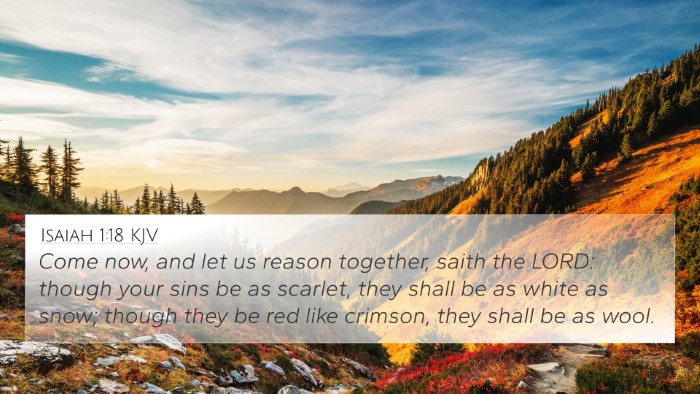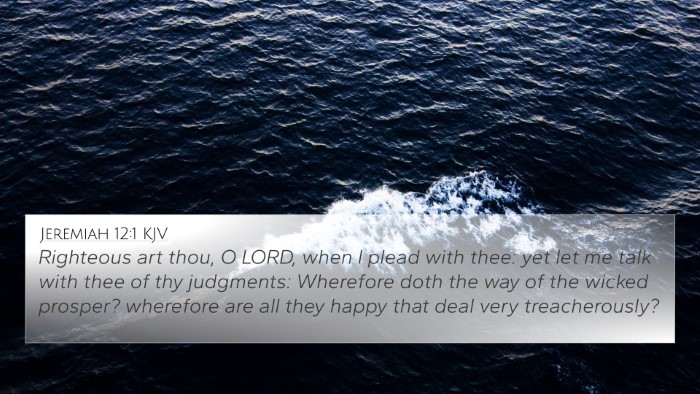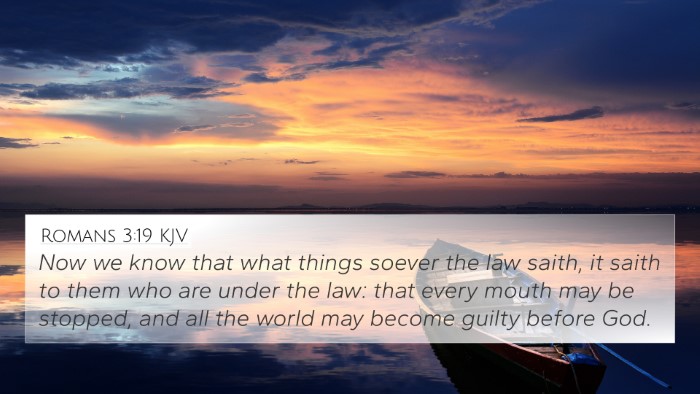Old Testament
Genesis Exodus Leviticus Numbers Deuteronomy Joshua Judges Ruth 1 Samuel 2 Samuel 1 Kings 2 Kings 1 Chronicles 2 Chronicles Ezra Nehemiah Esther Job Psalms Proverbs Ecclesiastes Song of Solomon Isaiah Jeremiah Lamentations Ezekiel Daniel Hosea Joel Amos Obadiah Jonah Micah Nahum Habakkuk Zephaniah Haggai Zechariah MalachiJob 23:7 Similar Verses
Job 23:7 Cross References
There the righteous might dispute with him; so should I be delivered for ever from my judge.
Uncover the Rich Themes and Topics of This Bible Verse
Listed below are the Bible themes associated with Job 23:7. We invite you to explore each theme to gain deeper insights into the Scriptures.
Job 23:7 Cross Reference Verses
This section features a detailed cross-reference designed to enrich your understanding of the Scriptures. Below, you will find carefully selected verses that echo the themes and teachings related to Job 23:7 KJV. Click on any image to explore detailed analyses of related Bible verses and uncover deeper theological insights.

Job 9:15 (KJV) »
Whom, though I were righteous, yet would I not answer, but I would make supplication to my judge.

Isaiah 1:18 (KJV) »
Come now, and let us reason together, saith the LORD: though your sins be as scarlet, they shall be as white as snow; though they be red like crimson, they shall be as wool.

Jeremiah 3:5 (KJV) »
Will he reserve his anger for ever? will he keep it to the end? Behold, thou hast spoken and done evil things as thou couldest.

Jeremiah 12:1 (KJV) »
Righteous art thou, O LORD, when I plead with thee: yet let me talk with thee of thy judgments: Wherefore doth the way of the wicked prosper? wherefore are all they happy that deal very treacherously?

Romans 3:19 (KJV) »
Now we know that what things soever the law saith, it saith to them who are under the law: that every mouth may be stopped, and all the world may become guilty before God.

Romans 8:1 (KJV) »
There is therefore now no condemnation to them which are in Christ Jesus, who walk not after the flesh, but after the Spirit.

Romans 8:33 (KJV) »
Who shall lay any thing to the charge of God's elect? It is God that justifieth.
Job 23:7 Verse Analysis and Similar Verses
Understanding Job 23:7
Job 23:7: "There the upright might dispute with him; and so should I be delivered forever from my judge."
This verse encapsulates Job's deep desire for an audience with God, where he can present his case and be vindicated. In the context of his suffering, Job believes that a fair conversation with God would lead to justice.
Summary of Insights from Commentaries
- Matthew Henry: Henry emphasizes Job's longing for a just hearing before God. He suggests that this reflects the broader human desire for righteousness and justice in the face of suffering. Job’s plea to dispute with God illustrates the intensity of his anguish and the need for divine clarity in the midst of despair.
- Albert Barnes: Barnes highlights the significance of uprightness in Job's argument. The notion that Job believes his integrity would allow him to stand in direct confrontation with God suggests a profound trust in God’s justice. This reinforces the theme of suffering as a pathway to understanding divine sovereignty.
- Adam Clarke: Clarke discusses the implications of being “delivered forever from my judge.” He posits that Job is not seeking to escape judgment but rather desires a fair examination of his life and actions. This desire exemplifies the human quest for assurance that one's sufferings are not a reflection of divine disfavor.
Key Themes in Job 23:7
This verse connects with several biblical themes including:
- Integrity and Justice: The theme of maintaining integrity amidst suffering is paramount. Job’s assertion of uprightness provides a crucial backdrop to his plea.
- Desire for Divine Dialogue: Job's yearning for a conversation with God signifies humans' need for interaction with the divine to reconcile their suffering with their faith.
- Faith in God's Righteousness: Despite his afflictions, Job faces God with confidence in His justice, a testament to profound faith.
Connections Between Bible Verses
Job 23:7 resonates with various other scripture passages that reflect on themes of suffering, justice, and divine interaction:
- Psalm 25:1-2: The psalmist also expresses trust in God during times of trouble, emphasizing the desire for protection and vindication.
- Psalm 73:16-17: The idea of understanding God’s ways through dialogue reflects Job's plea for clarity regarding his own suffering.
- Romans 8:31: "If God is for us, who can be against us?"—a reminder of confidence in God’s justice.
- 1 Peter 3:14: This verse parallels Job's situation, highlighting the importance of blessedness in suffering for righteousness' sake.
- Hebrews 4:16: Encourages believers to approach the throne of grace, much like Job approached God to plead his case.
- James 5:11: Speaks to the patience of Job, providing a reminder of the ultimate purpose behind suffering.
- Isaiah 1:18: God's willingness to reason with His people, akin to Job's longing for dialogue.
Comparative Bible Verse Analysis
In comparing Job 23:7 with these verses, we see:
- Similar affirmations of faith amidst suffering.
- The common human experience of seeking to understand divine justice.
- A shared hope for vindication and recognition from God.
Thematic Bible Verse Connections
Exploring the themes presented in Job 23:7 reveals how it fits within broader biblical narratives:
- Job’s challenge connects to narratives of other biblical figures like David, who also sought God for clarity in trials.
- Job's honesty in his suffering can be contrasted with the honesty of the lament psalms, which voice similar struggles.
- The motif of “uprightness” serves as a link between Job and the Apostolic teachings on righteousness, particularly in the letters of Paul.
Conclusion
Job 23:7 provides rich material for comparative analysis across various scripts and serves as a critical linchpin in understanding human faith in the face of suffering. The desire for divine justice expressed by Job resonates deeply across biblical texts, serving as a reminder of God’s righteousness and the importance of seeking truth in one’s spiritual journey. By employing tools for Bible cross-referencing, believers can explore these connections further, enriching their understanding of scripture.



